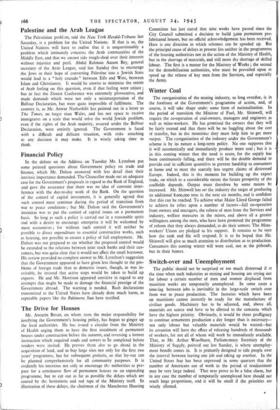The Drive for Houses
Mr. Aneurin Bevan, on whom rests the major responsibility for justifying the Government's housing policy, has begun to ginger up the local authorities. He has issued a circular from the Ministry of Health urging them to have the first instalthent of permanent houses under construction before the autumn, and reversing a former instruction which required roads and sewers to be completed before tenders were invited. He presses them also to go ahead in the acquisition of land, and to buy large sites not only for the first two years' programme, but for subsequent projects, so that lay-out can be planned comprehensively for all community purposes. It is evidently his intention not only to encourage the authorities to pre- pare for a continuous flow of permanent houses on an expanding programme, but to cut out as far as possible the delays which are caused by the hesitations and red tape of the Ministry itself. In illustration of these delays, the chairman of the Manchester Housing
Committee has just stated that nine weeks have passed since the City Council submitted a decision to build 3,000 permanent pre- fabricated houses, but no official ackno,vledgement has been received. Here is one direction in which schemes can be speeded up. But the principal cause of delays at present lies neither in the programmes of the housing authorities nor in the action of the Ministry of Health, but in the shortage of materials, and still more the shortage of skilled labour. The first is a matter for the Ministry of Works ; the second for the demobilisation authorities, who must be prevailed upon to speed up the release of key men from the Services, and especially the Army.






















 Previous page
Previous page